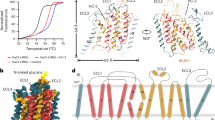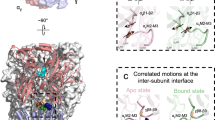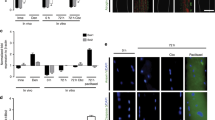Abstract
IT has been proposed1–3 that choline transport, particularly that performed by the so-called high-affinity system, is obligatorily coupled to acetylcholine synthesis and therefore only choline that has just entered by the transport mechanism is acetylated. If this were so it would imply that the enzyme choline acetyltransferase is bound close to the transport sites on the membrane. The problem is important because of its implications for the molecular organisation of the synapse and also because subcellular fractionation studies4,5 show fairly clearly that, at the ionic strengths prevailing inside the cell, choline acetyltransferase is soluble and not bound to the plasma or synaptic vesicle membrane (as would be expected if the hypothesis of obligatory coupling is true). The evidence for this is indirect and relies on the finding that the half-maximal concentration for acetylation of choline and its analogues in situ approximates more nearly to the half-maximal concentration of their transport than of their acetylation by the isolated enzyme1. However, this need only imply a coupling between transport and synthesis if the latter is rate controlling, and from a survey6 of the rates of release and synthesis of acetylcholine (ACh) it seems that the activity of choline acetyltransferase is in considerable excess of normal requirements. Certain exceptions to the obligatory coupling of transport and synthesis have been noted but these involve synthetic analogues of choline7 or unusual preparations8,9. Reduction of the acetyl-CoA levels reduces ACh concentrations without a concomitant reduction in choline transport10 but neither this nor the previous studies exclude the possibility that the residual ACh synthesis remains coupled; that is, obligatorily dependent on choline that has just been transported across the membrane. We describe here an experiment which we believe demonstrates that choline that has been recently transported has no privileged access to choline acetyltransferase in the synaptic terminal. Instead it mixes with the pre-existing pool of choline and therefore there is no coupling between transport and synthesis.
This is a preview of subscription content, access via your institution
Access options
Subscribe to this journal
Receive 51 print issues and online access
$199.00 per year
only $3.90 per issue
Buy this article
- Purchase on Springer Link
- Instant access to full article PDF
Prices may be subject to local taxes which are calculated during checkout
Similar content being viewed by others
References
Barker, L. A. & Mittag, T. W. J. Pharmac. exp. Ther. 192, 86–94 (1974).
Simon, J. R., Atweh, S. & Kuhar, M. J. J. Neurochem. 26, 909–922 (1976).
Lefresne, P., Guyenet, P., Beaujouan, J. C. & Glowinski, J. J. Neurochem. 25, 415–422 (1975).
Fonnum, F. Biochem. J. 109, 389–397 (1968).
Marchbanks, R. M. & Israel, M. Biochem. J. 129, 1049–1061 (1972).
Marchbanks, R. M. in Synapses (eds Cottrell, G. A. & Usherwood, P. N. R.) 81–101 (Blackie, Glasgow, 1977).
Collier, B., Ilson, D. & Lovat, S. in Cholinergic Mechanisms and Psychopharmacology (ed. Jenden, D. J.) 457–464 (Plenum, New York, 1977).
Dowdall, M. J. in Cholinergic Mechanisms and Psychopharmacology (ed. Jenden, D. J.) 359–375 (Plenum, New York, 1977).
Burgess, E. J., Atterwill, C. K. & Prince, A. K. J. Neurochem. 31, 1027–1033 (1978).
Jope, R. S., Weiler, M. H. & Jenden, D. J. J. Neurochem. 30, 949–954 (1978).
Marchbanks, R. M. Biochem. J. 110, 533–541 (1968).
Marchbanks, R. M. & Israel, M. J. Neurochem. 18, 439–448 (1971).
Wonnacott, S. & Marchbanks, R. M. Biochem. J. 156, 701–712 (1976).
Marchbanks, R. M. & Wonnacott, S. in The Cholinergic Synapse, Progress in Brain Research, 49, Ch. 6 (ed. Tuček, S.) (1979).
Yamamura, H. I. & Snyder, S. H. J. Neurochem. 21, 1355–1374 (1973).
Haga, T. & Noda, H. Biochim. biophys. Acta 291, 564–575 (1973).
Guyenet, P., Lefresne, P., Rossier, J., Beaujouan, J. C. & Glowinski, J. Molec. Pharmac. 9, 630–639 (1973).
Dowdall, M. J. & Simon, E. J. J. Neurochem. 21, 969–982 (1973).
Author information
Authors and Affiliations
Rights and permissions
About this article
Cite this article
KESSLER, P., MARCHBANKS, R. Choline transport is not coupled to acetylcholine synthesis. Nature 279, 542–544 (1979). https://doi.org/10.1038/279542a0
Received:
Accepted:
Published:
Issue Date:
DOI: https://doi.org/10.1038/279542a0
This article is cited by
-
Inhibition of synaptosomal choline uptake by tetanus and botulinum a toxin
Naunyn-Schmiedeberg's Archives of Pharmacology (1981)
Comments
By submitting a comment you agree to abide by our Terms and Community Guidelines. If you find something abusive or that does not comply with our terms or guidelines please flag it as inappropriate.



